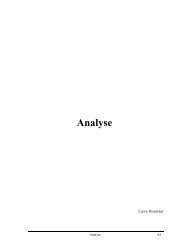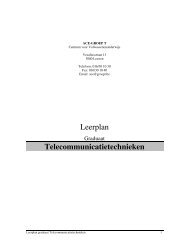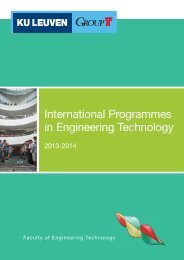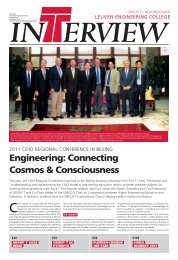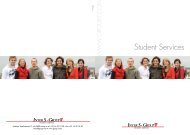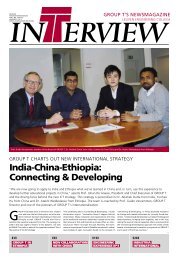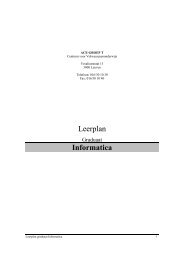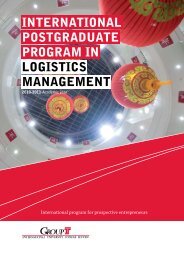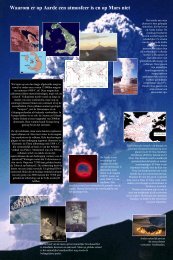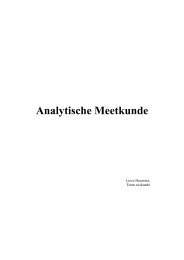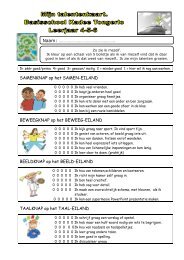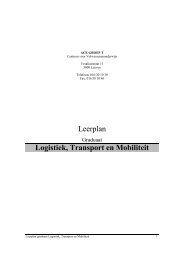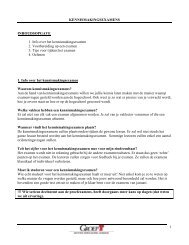Group t and Beijing Jiaotong university open International ... - Groep T
Group t and Beijing Jiaotong university open International ... - Groep T
Group t and Beijing Jiaotong university open International ... - Groep T
Create successful ePaper yourself
Turn your PDF publications into a flip-book with our unique Google optimized e-Paper software.
Plurality of world visions<br />
On happiness: the message of<br />
Ajahn Jayasaro<br />
“It is essential that Buddhist life is measured by the way it is lived <strong>and</strong> not by the extent to which laws <strong>and</strong><br />
regulations are obeyed,” according to the honorable monk Ajahn Jayasaro. On 28 May 2010, he was guest<br />
at GROUP T on the invitation of H.E. Pisan Manawapat, Ambassador of Thail<strong>and</strong> in Belgium. Ajahn Jayasaro<br />
gave an illuminating lecture on a topic that touches <strong>and</strong> captivates every human being: happiness.<br />
Ajahn Jayasaro is of English origin but has<br />
been living in Thail<strong>and</strong> for quite some<br />
time. As a young man, he was introduced<br />
to Buddhism by reading the st<strong>and</strong>ard work<br />
“The Way of Zen” by Allan Watts. This made such an<br />
impression on him that, at 17 years of age, he went<br />
to India for a year. After that, in Engl<strong>and</strong>, he came<br />
into contact with a group of Buddhist monks, got to<br />
know their way of life <strong>and</strong> in 1978, decided to leave<br />
for northern Thail<strong>and</strong>. There he became student of<br />
one of the most important masters of meditation:<br />
Ajahn Cha. Although the life of a Buddhist monk is<br />
very hard, he knew immediately that this was what<br />
he had always been looking for. Ajahn Cha guided<br />
him to his inauguration as a monk <strong>and</strong> subsequently<br />
he stayed at various forest monasteries in Thail<strong>and</strong>.<br />
After having been the abbot of the forest monastery<br />
Wat Pa Nanacha for some time, he retreated to<br />
the foot of the Kow Yai mountain. He now teaches<br />
meditation there <strong>and</strong> has written several books on<br />
Buddhism in Thai, the language that has in the meantime<br />
become his second mother tongue.<br />
Enlightenment<br />
According to Ajahn Jayasaho, the ultimate goal of a<br />
Buddhist is to arrive at a state of enlightenment, of<br />
full underst<strong>and</strong>ing, a state that Buddha had attained<br />
during his life. A Buddhist believes that we all have<br />
the capacity to achieve this enlightenment <strong>and</strong> thus<br />
can clear our minds of fear, pain <strong>and</strong> anything negative.<br />
However, it is not limited to faith alone: a Buddhist<br />
also effectively wants to achieve this, just as a<br />
scientist tests a hypothesis. “The Buddha wants us to<br />
question ourselves <strong>and</strong> the way we live, to bring to<br />
fruition what is pure <strong>and</strong> beautiful.”<br />
Continuing his lecture, Ajahn Jayasaro elaborated<br />
on the “Four noble truths” that constitute the<br />
foundation for all Buddhist students. A key word in<br />
these truths is ‘dukkha.’ Our Western languages do<br />
not have an equivalent for this word <strong>and</strong> it is usually<br />
translated by approximation as ‘suffering.’ This<br />
translation is misleading, however. Here, we come<br />
across an essential given, namely, that ‘underst<strong>and</strong>ing’<br />
relies heavily on language. Since Western languages<br />
do not have words for certain concepts <strong>and</strong><br />
subtle differences, it is not easy for us to grasp the<br />
core of Buddhist teachings which are closely related<br />
to Eastern languages. From his English background,<br />
Ajahn Jayasaro put us in the right direction: “The<br />
expression ‘life’s not easy’ is a better description of<br />
what is meant by ‘dukkha.’” According to a Buddhist,<br />
our lives lack true happiness as unenlightened people.<br />
Because we ‘know’ there is such a thing as true<br />
happiness, we feel the lack of it. Buddhist training<br />
is a way to achieve this happiness. “For the Buddha,<br />
it is necessary to accomplish an equilibrium in your<br />
relation with the external <strong>and</strong> the internal world:<br />
the material world, social aspects, one’s emotions<br />
<strong>and</strong>, finally, wisdom.” For Ajahn Jayasaro, it is not<br />
enough to take one element, for instance meditation,<br />
no matter how valuable it may be. An example<br />
of this, according to him, is when meditation is used<br />
for, among other purposes, therapy. Buddhism, after<br />
all, is a holistic system.<br />
Experiences<br />
People experience a sense of incompleteness, a lack<br />
of happiness. “It is strange that everybody wants to<br />
be happy, but that education systems worldwide in<br />
school <strong>and</strong> family do not have the achievement of<br />
happiness as their primary goal.” Happiness is far<br />
from the experience of pleasure, of satisfaction. Not<br />
that Buddhism is puritan <strong>and</strong> seeks to create feelings<br />
of guilt. “As regards pleasant, agreeable experiences,<br />
human beings do not have an internal mechanism<br />
or principle that tells them that that experience is<br />
enough. As a result, they always strive for more, the<br />
stimulus must be increased to maintain the same<br />
experience of pleasure, there will always be an experience<br />
missing <strong>and</strong>, in the worst case, the result will<br />
be jealousy or theft.” For Ajahn Jayasaro, Buddhist<br />
teachings offer a way out here. They teach you how<br />
to analyze <strong>and</strong> question a pleasurable situation or an<br />
agreeable object in order to verify whether it leads<br />
to true happiness.<br />
Another way to true happiness is to give to your fellow<br />
human being. “Giving to others is a foundation<br />
of Buddhist teachings because it allows you to examine<br />
how much you are attached to the material. It is<br />
also the proof that there is meaning to life.”<br />
Mental peace<br />
On our way to happiness, we are often hindered by<br />
our impulses, our desires. “Just like animals, we have<br />
impulses. But unlike animals, we have the ability to<br />
distance ourselves from them <strong>and</strong> to learn how to deal<br />
with these impulses. As a result, negative feelings are<br />
reduced <strong>and</strong> mental peace is accomplished.” In fact, to<br />
Ajahn Jayasaro, this reflection constitutes meditation.<br />
“The Thai word for this is ‘Otton’: continually exercising<br />
patience or being at peace with the unpleasant.<br />
If you can do this, you reinforce your inner strength.”<br />
The extent to which language can be a hindrance to<br />
truly grasping the subtleties in life views is shown from<br />
the fact that Thai has two words for desire. “The word<br />
Tanha one could describe as the desire that issues<br />
from mistaken underst<strong>and</strong>ing, the not knowing, while<br />
Sh<strong>and</strong>a ensues from knowledge, the desire to help.”<br />
Buddhism describes itself as lifelong learning in the<br />
search for underst<strong>and</strong>ing ourselves <strong>and</strong> others. By coming<br />
to a better underst<strong>and</strong>ing, Buddhists experience<br />
more refined forms of happiness which they can share<br />
with others. Being happy is closely related to the clarity<br />
of our vision. Meditation plays an important role in<br />
this: these are moments in which you shield yourself<br />
from external stimuli <strong>and</strong> during which you experience<br />
what it is like to be alone with yourself with no<br />
distractions. “We all know the news from all over the<br />
world, but we are unaware of the news in ourselves.<br />
It is very important to get in touch with yourself, that<br />
gives you a new perspective, a new dimension. Maybe<br />
it is better, therefore, to speak of well-being rather<br />
than happiness.”<br />
Technology<br />
Ajahn Jayasaro was given a guided tour by<br />
Director General Guido Vercammen.<br />
At the end of his lecture, Ajahn Sayaharo took a<br />
great deal of time to answer questions from the<br />
audience. In addition to questions about the life of<br />
a Buddhist monk, a member of the audience asked<br />
whether technology could contribute to happiness.<br />
According to Ajahn Jayasaro we must ask ourselves<br />
by which values we want to live <strong>and</strong>, more specifically,<br />
try to find out what is ‘enough’ for us, what<br />
we want to use the technology for <strong>and</strong> how much<br />
of the world we want to devote to our consumption.<br />
A Buddhist has not an a priori negative disposition<br />
towards technological advancement. Where useful,<br />
he uses it. For instance, modern technology brought<br />
along YouTube which enabled Ajahn Jayasaro’s to<br />
share quite a few of his lectures <strong>and</strong> to reach a multitude<br />
of listeners with his message.<br />
Jan Jaspers<br />
jg. 20, nr. 1, 15 december 2010<br />
GROUP T<br />
19



